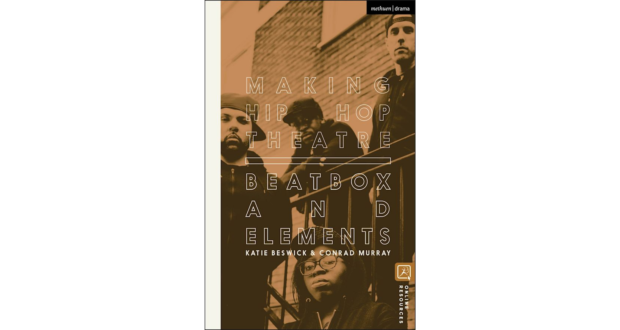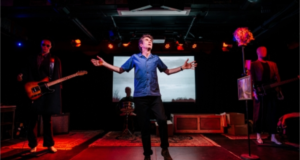By Katie Beswick and Conrad Murray
So much more than a manual for beatboxing in theatre: this book is a manifesto for possibility. It is a considered, enormously generous piece of writing that offers authenticity, validation and life coaching, with all the grit left in. Summary
Rating
Excellent
Making Hip Hop Theatre is a dynamic piece of work, packed with energy and attitude. Written by Katie Beswick. a writer and theatre academic, along with Conrad Murray, the theatre-maker and performer who heads up the Battersea Arts Centre’s Beatbox Academy, its premise is that it offers practical tuition and advice to people wanting to learn about hip hop and its place in theatre. Its wider form, however, covers a breadth of lived knowledge and history, which is fascinating and empowering.
In many respects the work falls in a space somewhere between a manual for performance and an academic study of a genre. It not only offers exercises in beatboxing practice, but also explores the history and ethos of hip hop and how this can very specifically impact upon theatrical innovation, challenging the norm using working class and minority-ethnic perspectives. We are shown devised theatre that creates a valuable safe space in which to be heard; in which to experiment and even fail. It is also a place to celebrate the value of every life story, of collaboration, mutual achievement and the success of peers. This philosophy is the backbone of the approach to teaching and learning that Murray offers.
The authors describe the book as structured so you won’t miss anything if you dip in and out, and this is exactly the case. You could easily just extract the exercises and work through them, but the additional commentary gives the performance and participation so much context, adding a richness that further rewards the reader. Multiple voices and opinions from the hip hop community are represented in different typefaces, writing styles and pull-out boxes, so there is a constant sense of an intersectional, diverse community hub, which the student is invited into. Whichever approach you take, the writing is geared up to allow for a unique response from each reader, which parallels the validating hip hop mindset described.
The exercises are clear and easy to follow, and there is an additional website that offers support material, though I didn’t immediately find a link to that in the text and had to look it up. They move from basic sound-making into processes of collaboration and initiating responses from nervous individuals, through to taking your craft to the stage, with highly specific and useful advice.
The third section on case studies is very honest, with Murray being interviewed about processes he has used in creating shows. He describes how he was forced to carve out his own space, using the medium of hip hop to process angry thoughts and feelings, and how people found this intimidating as he disrupted their norm. Murray talks unapologetically about how his early work was unbelievably extreme; intended to shock an audience in describing the brutality of lived experience, and indeed some of the things he describes did make me uncomfortable. How ‘rape jokes’ can ever be acceptable as entertainment I personally can’t fathom. But he also describes an evolution of work, and challenges that have been overcome, to learn skills and communicate experience in different ways. Now in a position where his work is respected, sharing his knowledge offers a ‘passport’ of possibility; demonstrating to working class readers and performers that ownership of, and access to, classic writing such as Shakespeare is theirs if they choose.
I can’t claim that this book is flawless: there are a few typos, it might benefit from a glossary, and if read linearly the ‘dip in wherever’ approach can occasionally feel like there’s repetition. Yet, Murray’s personal generosity of spirit, raw authenticity and enthusiasm is totally inspirational, and for me the supplementary commentary makes the ‘manual’ quite special. It puts him at the hub of an organic collaboration, drawing all its disparate parts together and giving strength. His practice faces up the establishment and forces it to take notice.
This is a great read, no matter what side of the class divide you are on, as it provides everyone tools not only for performance, but for understanding, appreciation and promise.
Authors: Katie Beswick and Conrad Murray
Published by: Bloomsbury Publishing/ Methuen Drama
Making Hip Hop Theatre is out now in hardback, paperback and ebook. It is available from all good booksellers.
 Everything Theatre Reviews, interviews and news for theatre lovers, London and beyond
Everything Theatre Reviews, interviews and news for theatre lovers, London and beyond



